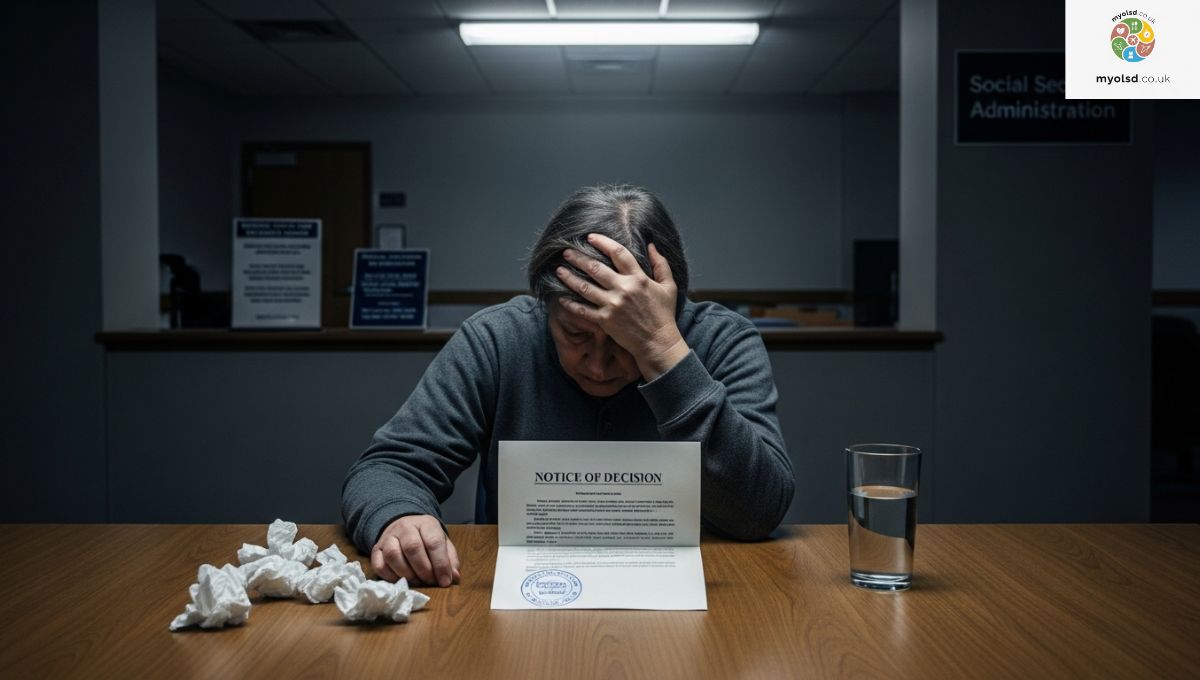Have you ever left a disability hearing feeling unsure, anxious, or even defeated? It’s frustrating when you’ve prepared for weeks, shared your story, and still can’t tell if things went in your favor. You might be lying awake at night wondering, Did I just lose my chance at getting the benefits I need? These moments of doubt can feel overwhelming, especially when so much is on the line.
In this post, we’ll walk you through the key signs that you lost your disability hearing so you can understand what to look for and why certain outcomes happen. You’ll get clear, practical insights on how judges and experts evaluate claims, what mistakes can impact your case, and what steps you can take next. By the end, you’ll have a better sense of your situation and feel more confident about planning your next move.
Disability Hearings Explained
A Social Security disability hearing is an important part of the process for anyone applying for SSDI or SSI benefits. If your initial application or reconsideration request has been denied, the next step is a hearing before an administrative law judge (ALJ). These hearings provide claimants a chance to present evidence, testify about their impairments, and explain how their disability affects their day-to-day life.
At the hearing, several key figures play a role. The ALJ oversees the proceeding, evaluates the evidence, and asks questions. A vocational expert (VE) may testify about your ability to work under certain limitations and compare your skills to the national economy. A medical expert might review your records and explain how your conditions meet or fail to meet the SSA Blue Book criteria. Proper preparation, including gathering medical records, legal briefs, and expert opinions, is critical. Any gaps in documentation or inconsistencies can impact your credibility and influence the outcome.
Medical records, supporting statements from physicians, and personal testimony all combine to create the judge’s understanding of your condition. The judge considers not only the severity of your impairments but also your ability to perform daily living activities and work-related functions. Because each case is unique, there is no guarantee of approval, but being aware of how hearings work can help you interpret potential signs that things didn’t go your way.
Signs The Hearing Did Not Go Well

The Judge is Skeptical of Your Testimony
One of the first signs that a hearing may not have gone in your favor is when the judge appears skeptical of your testimony. This can include repeated questions about your work history, daily living activities, or the consistency of your statements. If the ALJ questions your credibility, it may signal that they have doubts about the evidence presented.
Skepticism can also arise if your responses seem inconsistent with medical records or previous statements. Judges are trained to notice discrepancies, and even small inconsistencies can lead them to question your overall credibility. While this doesn’t guarantee a denial, it is a warning sign that your testimony alone may not have been enough to convince the ALJ.
Your Medical Records Had Bad Facts
Another indicator of a poor outcome is when your medical records contain “bad facts.” These could be notes showing improvement, gaps in treatment, or conflicting diagnoses. ALJs often scrutinize medical documentation, and any negative evidence can impact their decision.
For example, if your doctor’s notes suggest your condition is not as limiting as you claim, or if you continued working after the alleged onset date, these can weaken your case. Addressing such facts proactively is important, but if they weren’t adequately explained during the hearing, it could be a sign that your disability claim may face an unfavorable decision.
Your Record is Incomplete
Incomplete records can be a major hurdle. If your hearing file lacks recent updates, supporting documentation, or proper medical evaluations, the judge may struggle to make a full assessment. Incomplete records often result in delays, supplemental hearings, or even outright denial.
If your attorney couldn’t submit all relevant evidence before the hearing or if you missed key doctor appointments, the judge may note these gaps. While some missing information can be addressed in appeals or supplemental hearings, an incomplete record often indicates the hearing didn’t go optimally.
Your Attorney Shows Concern
A knowledgeable disability attorney can often sense when a hearing isn’t going well. If your attorney appears concerned, hesitates in responses, or signals the need for additional evidence, it could indicate issues with the judge’s perception of your case.
Your attorney’s role is to highlight strengths, explain discrepancies, and support your credibility. If they are visibly worried about the outcome, this may reflect challenges that arose during the hearing, such as a skeptical judge, incomplete records, or complicated medical evidence.
Read more Article:Metal Siding That Looks Like Wood
Extensive or Repetitive Questioning

While some questioning is normal, a judge who asks excessive or repetitive questions may be signaling doubt. This often happens if the judge wants clarification about inconsistencies, doubts medical evidence, or is evaluating the weight of vocational expert testimony.
If you notice the judge asking multiple hypothetical questions to a VE or reviewing the same facts repeatedly, it might indicate that they are not fully convinced of your eligibility. Extended questioning can be a subtle sign that the hearing outcome may lean toward an unfavorable decision.
Vocational Expert Testimony and Other Indicators
Vocational experts (VEs) play a critical role in disability hearings. They evaluate your ability to work given physical and mental limitations, and they compare your skills to available jobs in the national economy. If the VE identifies several suitable jobs you could perform, the judge may lean toward denial.
Hypothetical questions are another indicator. Judges often ask VEs to consider multiple scenarios, ranging from minimal restrictions to more severe limitations. If the judge repeatedly tests your ability to work under hypothetical conditions, it may signal that they are not fully persuaded that you meet the SSA Blue Book criteria.
Other factors include whether your condition is recognized as disabling in the SSA listings and whether the judge acknowledges medical expert testimony supporting your claim. A judge who ignores favorable testimony or emphasizes discrepancies is often indicating skepticism.
What Happens After a Disability Hearing Loss
If your hearing outcome appears negative, several steps follow. The first is usually appealing to the Appeals Council within 60 days of the decision. The Appeals Council reviews the record for errors or overlooked evidence and may grant a review if the hearing process was flawed.
If the Appeals Council denies the request, your next option may be filing a federal lawsuit in district court. Here, legal counsel becomes critical. Your attorney can argue procedural errors, challenge interpretations of the evidence, and present new supporting documentation.
It’s important to note that even if the initial hearing didn’t go well, the process is not over. Effective legal strategies, supplementary evidence, and persistence can significantly enhance the likelihood of a favorable outcome in subsequent steps.
Strength in Numbers: The Importance of Legal Counsel

Having a qualified disability attorney can significantly impact your chances of success. Attorneys assist in gathering medical records, preparing witness testimony, and navigating the complex SSA process. Statistics show that claimants with legal representation are much more likely to receive disability benefits.
An attorney can also identify gaps in evidence, address bad facts, and strategize for appeals or federal litigation. Legal counsel ensures that your burden of proof is met and that your claims are presented clearly and convincingly. Even small oversights during the hearing can be addressed later with proper guidance.
Conclusion
Understanding the signs that you lost your disability hearing can help you take the right next steps. If the administrative law judge (ALJ) seemed skeptical, your medical records had bad facts, or your record was incomplete, these are clear indicators of a possible unfavorable decision. Working with a disability attorney and preparing supportive evidence, including vocational expert testimony, medical expert evaluations, and hypothetical questions, can improve your chances for a favorable ruling.
Even after a loss, you have options through the Appeals Council or federal court. Proper legal representation, attention to claimant rights, SGA compliance, and careful evidence submission can strengthen your case for disability benefits. By addressing bad facts, ensuring a complete record, and following the principle of administrative finality, you can maximize the likelihood of a successful hearing outcome.
FAQs
What hearing loss is considered a disability?
Hearing loss is considered a disability when it significantly limits your ability to hear and communicate in daily life or work, and when it meets the Social Security Administration’s criteria for disability.
Are you disabled if you have hearing loss?
You may qualify as disabled if your hearing loss prevents you from performing full-time work and affects your daily living, according to SSA or other legal definitions.
How do you describe pain to a disability judge?
Be honest and specific. Explain when it occurs, how severe it is, how it affects your daily activities, and provide medical records or expert testimony to support your claims.
How do you prove hearing disability?
Provide medical documentation, audiology test results, expert opinions, and examples of how hearing loss impacts your daily life and ability to work.
What are the first signs of hearing loss?
Early signs include difficulty following conversations, needing higher volume for TV or radio, asking people to repeat themselves, and struggling to hear in noisy environments.
Is hearing loss permanent?
Some hearing loss is permanent, especially sensorineural loss from age or injury, while others, like conductive loss from ear infections, may be temporary or treatable.
What are the 5 levels of hearing loss?
Hearing loss is categorized as mild, moderate, moderately severe, severe, and profound, based on how much sound you can hear at different frequencies.
At what age does hearing loss start?
Hearing loss can begin at any age but is more common after age 50, with gradual changes often starting in middle adulthood.


1 thought on “Signs You Lost Your Disability Hearing”